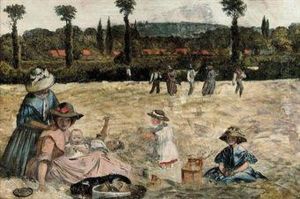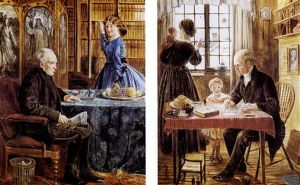Peter Paul Marshall Paintings
Peter Paul Marshall was a Scottish artist, designer, and partner in the decorative arts company, Morris, Marshall, Faulkner & Co., which later became Morris & Co. Born on 23 March 1830 in Edinburgh, Scotland, Marshall's contributions to the arts are often overshadowed by the more famous figures of William Morris and the other partners involved in the enterprise.
Marshall was educated as an engineer and started his career in civil engineering. However, his interests and skills were diverse, and he eventually became involved in artistic endeavors. In the 1850s, Marshall met William Morris and Edward Burne-Jones, who would become pivotal figures in the Arts and Crafts Movement. He was also associated with Dante Gabriel Rossetti, and through these connections, he became involved in the decorative arts movement that sought to bring beauty and craftsmanship back to production in the face of the Industrial Revolution's mass manufacturing processes.
In 1861, Marshall became one of the founding partners of Morris, Marshall, Faulkner & Co., which specialized in the production of decorative arts such as stained glass, furniture, and textiles. The company was notable for its commitment to handcrafted artistry and was involved in designing and making furnishings and decorations for churches, homes, and public institutions.
Despite his involvement with the company, Marshall's artistic profile remained relatively low, and his contributions were often overshadowed by his fellow partners. He is known to have worked on a few projects, including church decorations and stained glass designs, but specific works attributed to him are less well-documented compared to those by Morris, Rossetti, or Burne-Jones. In the 1870s, Marshall left the company, which was then rebranded as Morris & Co., to return to his engineering roots.
Marshall's life after his involvement with Morris & Co. saw him focus more on engineering projects, and he eventually moved away from the decorative arts. He passed away on 2 December 1900 in Bodorgan, Anglesey, Wales. While not as celebrated as some of his contemporaries, his early contributions to the foundation of Morris, Marshall, Faulkner & Co. played a role in shaping the aesthetic of the Arts and Crafts Movement in Britain.


